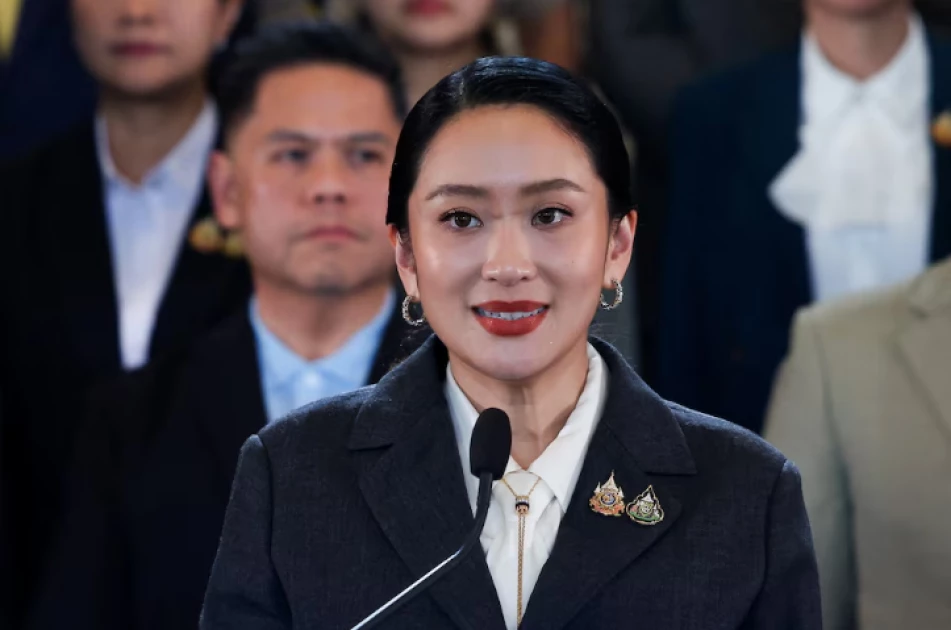Thai prime minister removed by court, triggering power scramble

Thailand's Paetongtarn Shinawatra, who was dismissed as prime minister, speaks during a press conference after the Constitutional Court ruled to remove her from office in a high-profile ethics case, following a leaked phone conversation between her and Cambodia's former leader Hun Sen, at Government House in Bangkok, Thailand, August 29, 2025. REUTERS/Chalinee Thirasupa

Audio By Vocalize
Thailand's Constitutional Court dismissed Prime
Minister Paetongtarn Shinawatra on Friday for an ethics violation, in
another crushing blow to the Shinawatra political dynasty that triggered a
flurry of deal-making aimed at filling the void.
Paetongtarn, who was Thailand's youngest prime minister,
becomes the sixth premier from or backed by the billionaire Shinawatra family
to be removed by the military or judiciary in a tumultuous two-decade battle
for power between the country's warring elites.
The ruling paves the way for the election by parliament of a
new prime minister, a process that could be drawn out, with
Paetongtarn's ruling Pheu Thai party losing bargaining power and facing a
challenge to shore up a fragile alliance with a razor-thin majority.
The court said Paetongtarn violated ethics in a leaked
June telephone call, during which she appeared to kowtow to Cambodia's
powerful former leader Hun Sen - until recently a close Shinawatra
family ally - when both countries were on the brink of an armed conflict.
Fighting erupted weeks later, lasting five days.
Hours after the decision, the Bhumjaithai Party that
had quit Paetongtarn's coalition over the call emerged as the early
frontrunner in forming a new government, with leader Anutin Charnvirakul shuttling
across Bangkok to rally support from parties, with pledges that included
dissolving parliament within four months.
The ruling brings a premature end to the premiership of the
daughter and protégé of divisive tycoon Thaksin Shinawatra and will
be a major test of his outsized political clout. Paetongtarn, 39, was a
political neophyte when she was abruptly thrust into power after the
surprise dismissal of Srettha Thavisin by the same court.
In a 6-3 decision, the court said Paetongtarn had put her
private interests before those of the nation and had damaged Thailand's
reputation.
"Due to a personal relationship that appeared aligned
with Cambodia, the respondent was consistently willing to comply with or act in
accordance with the wishes of the Cambodian side," it said.
Reacting to the decision, Paetongtarn called for all parties
to work together to bring political stability to Thailand.
"All I wanted was to safeguard the lives of people,
whether soldiers or civilians. I was determined to do all I can to protect
their lives before the violent clashes," she said.
She is the fifth premier in 17 years to be removed by the Constitutional
Court, underlining its central role in an intractable power struggle between
the governments of the Shinawatra clan and a nexus of powerful conservatives
and royalist generals with far-reaching influence.
The focus quickly shifted to who will replace Paetongtarn,
with Thaksin expected to be in the thick of horse-trading between parties and
other power-brokers to try to keep Pheu Thai at the helm.
Deputy premier Phumtham Wechayachai will be in charge as
caretaker until a new prime minister is elected by parliament, which on Friday
called a special session from September 3-5 but made no mention of a vote on a
new premier.
Phumtham said the coalition was still together and would
agree on a prime ministerial candidate with Pheu Thai at the core.
Five people are eligible to become premier, with only
one from Pheu Thai, 77-year-old Chaikasem Nitisiri, a former attorney general
with limited cabinet experience, who has maintained a low profile.
Others include ex-premier Prayuth Chan-ocha, who has
retired from politics and led a military coup against the last Pheu Thai
government in 2014, and former deputy prime minister Anutin, who late on
Friday said he already had the votes.
"This will be a government for the people, that will
help find a way out for the country ... and return the power to the
people," he said.
The ruling thrusts Thailand into more uncertainty, with
potential for political deadlock at a time of simmering public unease over
stalled reforms and a stuttering economy.
Any Pheu Thai-led administration would likely have a slender
majority and could face street protests and parliamentary challenges from an
opposition with huge public support that is pushing for an early election.
"Appointing a new prime minister...will be difficult
and may take considerable time," said Chulalongkorn University political
scientist Stithorn Thananithichot. "Pheu Thai will be at a
disadvantage."


Leave a Comment